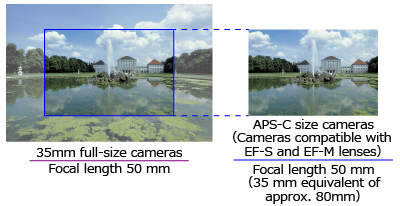Solution
Canon's EF-S lenses have adopted an optimized optical system and mechanical structure to accommodate an APS-C size sensor that is smaller than a 35mm full size sensor.
Using a Digital Single-Lens Reflex Camera or Interchangeable-Lens Compact System Camera with an APS-C image sensor, the replacement lens's 35 mm equivalent focal length is approximately 1.6 times greater, and the angle of view is more like that of a telephoto lens as a result. For example, if a 50 mm lens is attached to a camera with an APS-C size image sensor, the 35 mm equivalent focal length will be approximately 80 mm.
The following cameras are compatible with EF-S lenses:
EOS 7D Mark II / EOS 7D / EOS 70D / EOS 60D / EOS 60Da / EOS 50D / EOS 40D / EOS 30D / EOS 20D / EOS 20Da / EOS REBEL T5i, EOS 700D / EOS REBEL T4i, EOS 650D / EOS REBEL SL1, EOS 100D / EOS REBEL T3i, EOS 600D / EOS REBEL T2i, EOS 550D / EOS REBEL T1i, EOS 500D / EOS DIGITAL REBEL XSi, EOS 450D / EOS REBEL T5, EOS 1200D / EOS DIGITAL REBEL T3, EOS 1100D / EOS DIGITAL REBEL XS, EOS 1000D / EOS DIGITAL REBEL XTi, EOS 400D DIGITAL / EOS DIGITAL REBEL XT, EOS 350D DIGITAL / EOS DIGITAL REBEL, EOS 300D DIGITAL / EOS M3* / EOS M2* / EOS M*
* EF-S lenses can be used when the Mount Adapter EF-EOS M is attached.
IMPORTANT
The following models do not support EF-S lenses.
EOS-1D X / EOS-1Ds Mark III / EOS-1D Mark IV / EOS-1Ds Mark II / EOS-1Ds / EOS-1D Mark III / EOS-1D Mark II N / EOS-1D Mark II / EOS-1D / EOS 5D Mark III / EOS 5D Mark II / EOS 5D / EOS 6D /EOS 10D / EOS D60 / EOS D30
When attaching EF-S lenses to the camera body, align them with the white, square mount index. EF lenses should be aligned with the red, round mount index.
When attaching EF-S lenses to a camera compatible with EF-M lenses, first attach the EF-S lens to the Mount Adapter EF-EOS M, then attach this to the camera aligned with the white, round mount index.
Attaching the lens to the Mount Adapter is performed using the same process as attaching the lens to the body of a camera compatible with EF-S lenses.
NOTE
Thanks to the following reasons, Canon’s EF-S Lenses have been able to achieve optimized performance despite their compact and lightweight designs.
- The image circle (the round image area created by the light passing through the lens) has been reduced in line with the screen size of cameras compatible with EF-S lenses.
- To accommodate the smaller quick-return lens of the cameras, the back focus (the distance from the rear element of the lens and the sensor) is shortened further (short back focus) than that of the regular EF lenses.
REFERENCE
EF-S lenses have a mechanical configuration that makes it so that they cannot be mounted on cameras that are not compatible with ES-S lenses.
In addition, a protective rubber ring is attached to the back end of EF-S lenses so that the camera body is not damaged even if you try to attach the lenses to non-compatible cameras by mistake.


